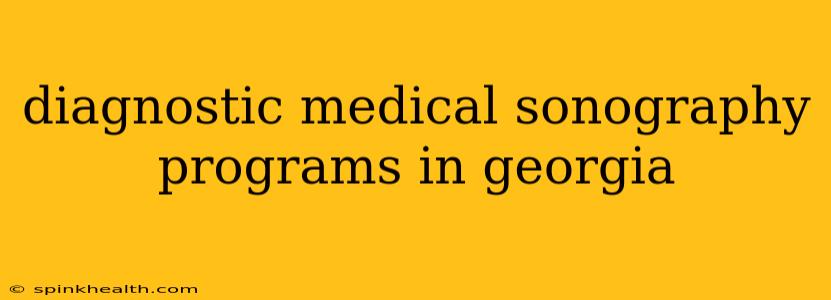Navigating the World of Diagnostic Medical Sonography Programs in Georgia: A Comprehensive Guide
The rhythmic pulse of the ultrasound machine, the ghostly grayscale images revealing the inner workings of the human body – this is the captivating world of diagnostic medical sonography. If you're drawn to this fascinating field and are considering pursuing a career as a sonographer in Georgia, you're in for an exciting journey. This guide will help you navigate the landscape of diagnostic medical sonography programs in Georgia, answering your most pressing questions along the way.
What are the prerequisites for diagnostic medical sonography programs in Georgia?
The path to becoming a registered diagnostic medical sonographer isn't a sprint; it's a marathon of dedication and hard work. Before you even think about applying, most programs in Georgia will require a high school diploma or GED. Beyond that, successful applicants typically possess a strong academic background, particularly in science and math. Many programs also prefer or require applicants to have completed prerequisite courses in anatomy, physiology, and sometimes even medical terminology. Think of these prerequisites as laying the foundation for your future studies—a solid base ensures a smoother climb to the top. It's always best to check the specific requirements of each program you're interested in, as they may vary slightly.
How long does it take to complete a diagnostic medical sonography program in Georgia?
The length of a diagnostic medical sonography program in Georgia generally ranges from 18 to 24 months, usually resulting in an Associate's degree. Some programs may offer accelerated options, while others might incorporate clinical rotations that extend the overall timeframe. The duration can also depend on the specific area of sonography you choose to specialize in – cardiovascular, abdominal, OB/GYN, etc. Choosing a program that fits your lifestyle and learning preferences is crucial to your success. Think of this period as an intensive investment in your future career, one that will yield significant rewards.
What are the best diagnostic medical sonography programs in Georgia?
Selecting the "best" program is highly subjective and depends on your individual needs and preferences. What works for one student might not work for another. Instead of focusing on a single "best," consider factors like program accreditation (essential for national certification!), faculty expertise, clinical experience opportunities, job placement assistance, and the overall learning environment. Researching several programs thoroughly will allow you to make an informed decision that aligns with your goals. Look beyond rankings and delve into the specific details of each program's curriculum and resources.
What are the job prospects for diagnostic medical sonographers in Georgia?
The outlook for diagnostic medical sonographers in Georgia is generally positive. The healthcare industry is constantly evolving, and skilled sonographers are in high demand. Georgia's growing population and aging demographics contribute to an increased need for qualified professionals in this field. The job market is diverse, with opportunities in hospitals, clinics, physician's offices, and imaging centers. However, remember that competition exists, and having a strong academic record, relevant clinical experience, and professional certifications significantly enhances your job prospects.
How much does it cost to attend a diagnostic medical sonography program in Georgia?
Tuition costs can vary significantly depending on the institution – whether it's a public or private college, a community college, or a specialized vocational school. Be sure to factor in not just tuition fees but also expenses like books, supplies, transportation, and living costs. Many programs offer financial aid options, scholarships, and grants to help students finance their education. Thorough research into the financial aspects is essential to avoid unexpected financial burdens during your program. Explore all possible funding sources early in the application process.
What is the licensing and certification process for diagnostic medical sonographers in Georgia?
After completing your program, you'll likely need to obtain both state licensure and national certification. The specific requirements might vary slightly depending on the area of sonography you specialize in. State licensure often involves fulfilling educational requirements, passing background checks, and perhaps completing continuing education courses. National certification, typically through organizations like the American Registry for Diagnostic Medical Sonography (ARDMS), demonstrates your competency and professionalism. These steps are crucial for legal and professional practice and are generally prerequisites for employment.
Embarking on a career in diagnostic medical sonography in Georgia is a rewarding endeavor. With thorough research, careful planning, and unwavering dedication, you can successfully navigate the path to becoming a qualified and highly sought-after sonographer. Remember, this is a journey, and each step you take brings you closer to achieving your professional goals.

